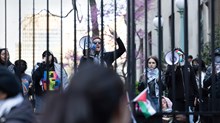Update (May 22): RNS examines whether the IRF report "needs more teeth" by including an updated list of Countries of Particular Concern.
––-
Among the most worrisome themes in international religious freedom this year? The use–and proliferation–of blasphemy and apostasy laws.
So says the U.S. Department of State in its 2012 International Religious Freedom Report, which was released today. The report reveals widespread "negative trends [that] often cut across national and regional boundaries," including the use of anti-conversion laws.
The State Department notes that "such laws often violate freedoms of religion and expression and often are applied in a discriminatory manner."
The State Department's report largely lines up with the analysis provided by the U.S. Commission on International Religious Freedom (USCIRF), an independent, bipartisan government commission, last month. USCIRF's report highlighted Burma, China, Eritrea, Iran, and North Korea as the world's worst violators of religious freedom. Similarly the State Department notes that conditions remain bad in all of these countries, which were designated in 2011 as "countries of particular concern" (CPCs).
However, the State Department did not add Egypt, Iraq, Nigeria, Tajikistan, Turkmenistan, or Vietnam, or Pakistan to the list of CPCs, as USCIRF had recommended.
A Government Accountability Office report released in April detailed the longstanding tensions and disjointed interactions between the two government bodies, which have separate missions.
Among the cases highlighted in the report are those of Pakistani Christians Asia Bibi, the first woman to receive the death sentence for blasphemy, and 14-year-old Rimsha Masih, whose high-profile case was dismissed by a judge last November. In addition, the State Department says that the Pakistani government's "general failure to investigate, arrest, or prosecute those responsible for societal abuses promoted an environment of impunity leading to increasing vigilantism and mob violence," such as the riots in Lahore earlier this year.
The State Department's report reviews persecution against all religions in nearly 200 countries, and includes many countries in the Middle East and western Asia. By contrast, African nations surged up the ranks on the World Watch List, which ranks the top 50 countries where Christians face the most religious persecution, in recent years.
CT has spotlighted the nations where it's hardest to believe and charted the differences between international religious freedom advocates, as well as covered a landmark Pew study on religious persecution.

Support Our Work
Subscribe to CT for less than $4.25/month


















